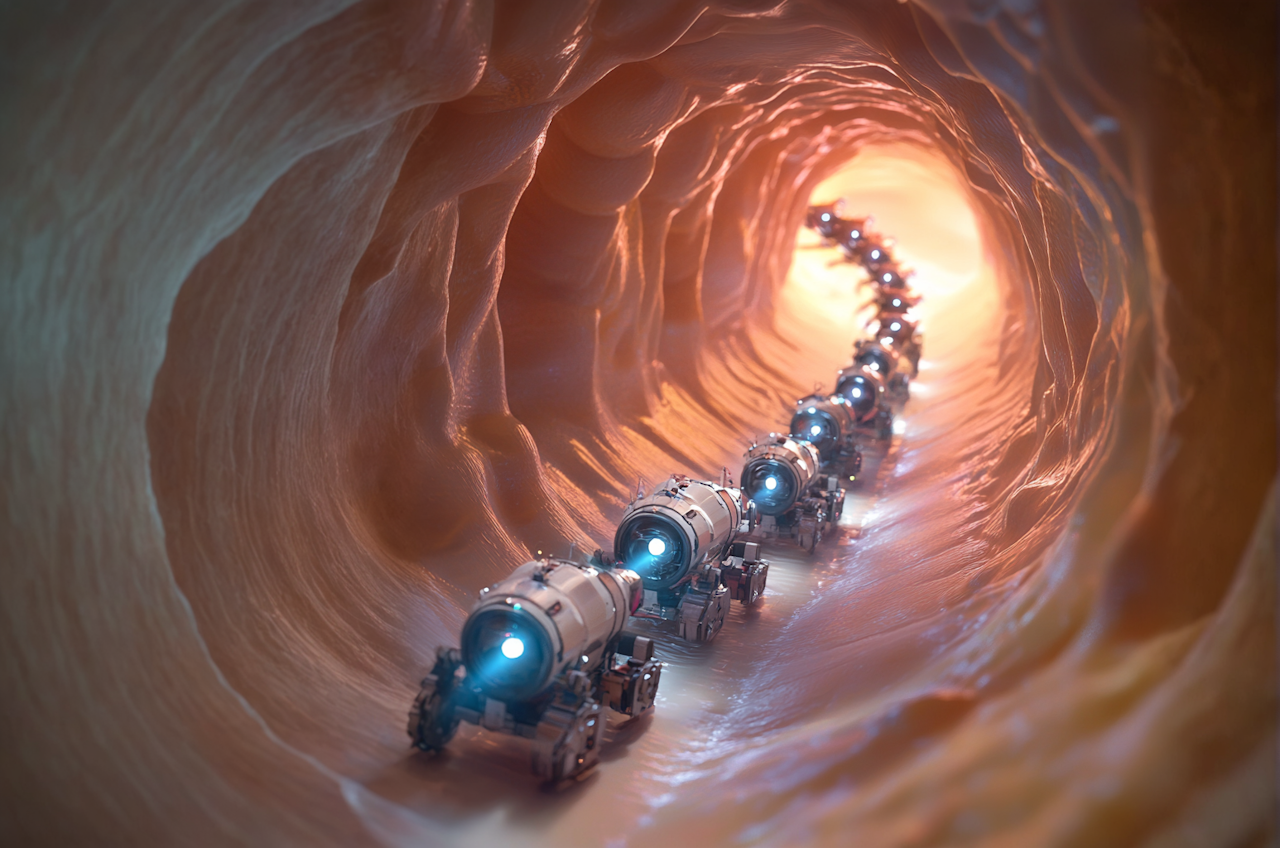Imagine a convoy of tiny robots, akin to a miniature train, navigating the intricacies of the human body to perform surgery. This might sound like a scene from a futuristic film, yet it is a reality being crafted by scientists at the German Cancer Research Center (DKFZ). Their groundbreaking work with miniature robots, known as TrainBots, is set to revolutionise endoscopic surgery.
Endoscopic microsurgery has traditionally been challenged by the limitations of millimetre-scale robotic devices, which often lack the strength to transport necessary instruments through the body. The DKFZ team has addressed these limitations by combining multiple TrainBots into a single, more robust unit. This innovation not only enhances the functionality of these robots but also marks a significant milestone by successfully performing an electric surgical procedure on a bile duct obstruction.
The Technological Leap Forward
The ingenuity of the TrainBots lies in their design and collective operation. Each robot is equipped with enhanced ‘feet’, a feature that significantly improves their movement and strength. By functioning as a cohesive unit, the convoy of TrainBots can transport endoscopic instruments more effectively than a single robot, thus overcoming one of the primary hurdles in miniature robotics. This technological leap is not just about power and movement; it is about precision and teamwork. The successful experimental procedure on a bile duct obstruction illustrates the potential applications of these robots in medical procedures that require high precision in hard-to-reach body areas. The TrainBots’ ability to navigate such challenging terrains opens up new possibilities for minimally invasive surgeries.
Paving the Way for the Future
The successful deployment of TrainBots in experimental surgery is a promising indicator of future advancements. The DKFZ team envisions broader applications across various types of surgeries, potentially transforming how delicate procedures are conducted. As research and development continue, the capabilities of these miniature robots are expected to expand, driving further innovations in medical robotics. The implications of such technological advancements extend beyond the operating room. They hold the promise of making surgeries less invasive, reducing recovery times, and improving patient outcomes. As the healthcare industry evaluates these new technologies, the potential for TrainBots to become a standard tool in surgical procedures seems increasingly likely.
A New Era of Surgery
As the TrainBots continue their journey in the realm of endoscopic surgery, they symbolise a new era of medical technology. These miniature robotic convoys are not just about enhancing surgical techniques; they represent a future where surgeries are more efficient, less invasive, and more accessible. The groundbreaking work by the DKFZ team is a testament to the potential of robotic-assisted surgeries, paving the way for innovations that could redefine medical practices worldwide. In the ever-evolving landscape of medical technology, the success of TrainBots is a beacon of what is possible when innovation meets necessity. As research continues, these tiny robots will likely play a significant role in shaping the future of surgery, offering hope and improved outcomes for patients around the globe.
In Other News…
OpenAI Showcases Realtime API and More at DevDay for AI App Innovators
OpenAI’s recent DevDay introduced a range of new features, including a Realtime API, designed to empower developers building AI-driven applications. The event highlighted the company’s latest advancements aimed at simplifying integration and enhancing real-time interaction for AI tools.
Read More
Generative AI Could Boost EU’s GDP by €1.4 Trillion by 2034, Google Reports
A recent report from Google suggests that the implementation of generative AI across Europe could increase the EU’s GDP by up to €1.4 trillion by 2034, potentially driving innovation and economic growth across industries.
Read More
AI to Spark Global Deflation, Says Silicon Valley VC Veteran Vinod Khosla
Venture capitalist Vinod Khosla predicts that artificial intelligence will be a key force in reducing inflation globally, suggesting that its efficiency gains will lead to significant cost reductions across industries.
Read More


